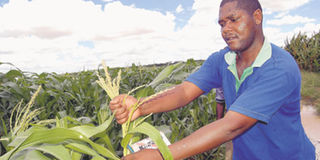Hunger crisis rekindles debate over GM maize

FILE | NATION
Research officer James Kirimi at work on a maize farm at the Bura Irrigation Scheme in Tana River last month. Pro-GM campaigners have called on the government to lift the ban on the import of genetically modified maize to mitigate the effects of the food shortage.
The deepening food crisis in Kenya that is fuelled by poor harvests and the rising cost of the staple maize meal has revived debate over whether the country should embrace genetically modified imports.
In the past few weeks, millers have publicly pushed for the lifting of a ban on GM maize imports.
Millers Association chairman Diamond Lalji said they were ready to bring in GM maize to supplement imports from Malawi and Zambia, following the duty waiver on imported maize and wheat announced by Finance minister Uhuru Kenyatta in his recent Budget.
“There is no scientific evidence that has cast a spell on GMOs. The crops are as good as naturally grown crops.
The resistance to them has more to do with negative perceptions and unnecessary doubts rather than facts,” Dr Lalji said. He also defended millers, saying they had nothing to do with the current maize shortage that has seen the retail price of a 2kg bag of maize shoot up to between Sh140 and Sh160, up from Sh80 three months ago.
Attracted opposition
The association’s position has attracted opposition from campaigners against genetically modified organisms who held a demonstration in Nairobi this week to protest any move towards GM crops.
Others who have consistently voiced opposition to GM maize imports are MPs on the parliamentary committee on agriculture chaired by Naivasha’s John Mututho.
But the pro-GMO campaigners have also received a boost after top biotechnology scholars and researchers at two public universities weighed in on the debate and endorsed GM maize.
Prof James Opiyo Ochanda, the director of the University of Nairobi’s Centre for Biotechnology and Bio-informatics, and Prof Samuel Gudu, a plant breeding specialist, say GM maize is safe for human consumption and will help mitigate the current shortage of the commodity in the country.
Prof Gudu is also Moi University’s deputy vice-chancellor in charge of planning and development.
“GMOs are proven safer than some of the medicines in the market whose efficacy level is between 70-80 per cent. GMOs are 100 per cent safe based on tests done by the World Health Organisation, Food and Agriculture Organisation and many other international testing mechanisms,” Prof Ochanda said.
He said it was unfortunate that some firms dealing with agrochemicals were opposed to GMOs because their universal acceptability was likely to adversely affect their sales.
“Such firms dealing with pest and insect chemicals should tell Kenyans the truth that their concern is how they stand to lose their market share instead of poisoning people’s minds that the GMOs are harmful to human health,” he said.
Scientifically safe
He said GMOs are scientifically safe and are consumed in many countries worldwide without posing any harmful side effects to the respective country’s population.
Prof Ochanda cited the United States, Canada, China, India, Argentina, Brazil and South Africa as some of the countries where GM crops are popular.
“The anti-GMO proponents are prophets of doom who are not keen to improve the country’s food security situation. They are opportunists pushing an agenda that they understand little about,” he said.
He explained that the herbicide and insect-resistant GM maize types limit the application of agrochemicals during the crops’ growth and storage and could thus lower the cost of production and increase farmers’ profit margins.
“Instead of applying chemicals, scientists came up with a way to introduce genes or molecules that allow the crop to protect itself.
This is better than application of chemicals which pollute and can harm the body, thus posing danger to our systems,” said Prof Ochanda.
He said the country was guided by many institutions mandated to ascertain the safety of products imported and sold in the country and ruled out the possibility that unsafe GM maize would end up in the country.
In addition to universities whose core mandate is to carry out research, he cited the Kenya Bureau of Standards that monitors the quality of products and the Kenya National Bio-safety Authority which addresses the safety of the environment and human health in relation to modern biotechnology.
“The Kenya Plant Health Inspectorate Services and the Kenya Agricultural Research Institute are among government institutions that ensure the public is not exposed to harmful products. Let’s rely on facts to spur development in the country,” he said..
Supplement their production
Prof Gudu said GM technology was not meant to hurt locally produced crops but to supplement their production.
He added that all that was required to determine the safety of maize approved for importation into the country is a thorough assessment of the genes in the maize.
“GMOs are meant to improve the quality of maize.
They can protect the crop against insects, and all Kenyans should be asking for are the details of the consignment to be brought in as opposed to expressing fear of GM crops,” Prof Gudu said.
He called on the government to inform farmers of viable agricultural investment options to enable them to make informed choices on GM crops.
He said that some farmers were reluctant to use new certified varieties of fertilizers in the market because they lacked information that the fertilizers had ingredients similar to those they were used to.
“Field extension officers from the ministry of Agriculture should be available to farmers to sensitise them about modern farming practices,” said Prof Gudu.
Dr Lalji added that the country was capable of producing enough food for its population and a surplus for export if the government directed a substantive amount of budgetary allocations for the Agriculture ministry towards increasing the volume of crop production.




